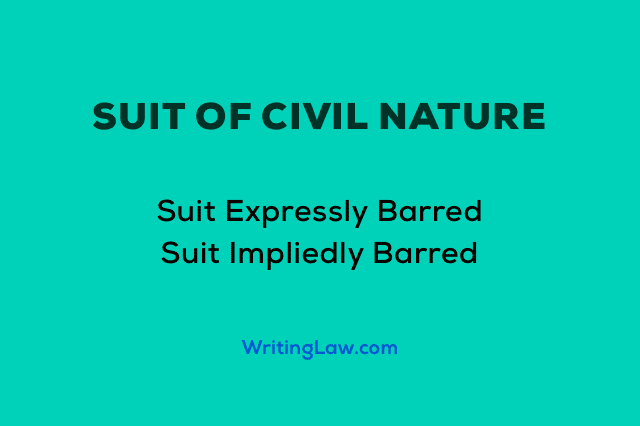
Under the Civil Procedure Code, 1908, a civil court is competent to try a suit when,
1. The suit is of civil nature.
2. The cognizance of such a suit should not be expressly or impliedly barred.
What Is Suit of Civil Nature
In the suit, if the principal question relates to the determination of a civil right, then the suit is of a civil nature. The expression suit of civil nature covers the private rights and obligations of a citizen. If the principal question relates to caste or religion, it is not a suit of civil nature.
The following can be held to be suits of civil nature:
1. Suits for damages for breach of contract.
2. Suits for specific relief.
3. Suits for conjugal rights.
4. Suits for the right of worship.
5. Suits for rent and so on.
Some suits that are not of civil nature are:
1. Suits involving purely religious rites.
2. Suits for mere dignity or honour.
3. Suits against compulsion from caste and so on.
What Is Suit Expressly Barred?
When a suit is barred by an enactment or act in force, then such a suit is said to be expressly barred.
For example, some of the matters that are expressly barred from the cognizance of a civil court are matters falling under revenue courts, special tribunals like an industrial tribunal, rent tribunal, labour tribunal.
But in case the remedy provided by statute is not adequate, then a person is not barred from taking the case to the jurisdiction of a civil court.
What Is Suit Impliedly Barred?
When a suit is barred by the general principles of law, then such a suit is said to be impliedly barred.
For example, political questions belong in the domain of the public administrative law and not the jurisdiction of a civil court. If there is a dispute of a political nature, a civil court has no authority to adjudicate such matters.
Conclusion
After reading the concept underlying section 9 of CPC, we can say that the civil court tries only suits of civil nature. And the cases which are not of civil nature or the suits which are expressly or impliedly barred are tried either in tribunals or councils or special courts specified under any enactment.
The questions purely relating to caste or religious ceremonies are decided by the community or religious heads like priests, spiritual heads, etc. On the other side, questions that are political in nature are decided by public administrative authorities.
Read Next: Domain Name Disputes and Their Redressal
- 18 Most Important Amendments to the Indian Constitution - 12th August 2023
- 8 Kinds and Theories of Punishment - 22nd July 2023
- What Is the Meaning of Res Judicata in Civil Procedure Code? - 22nd January 2023







